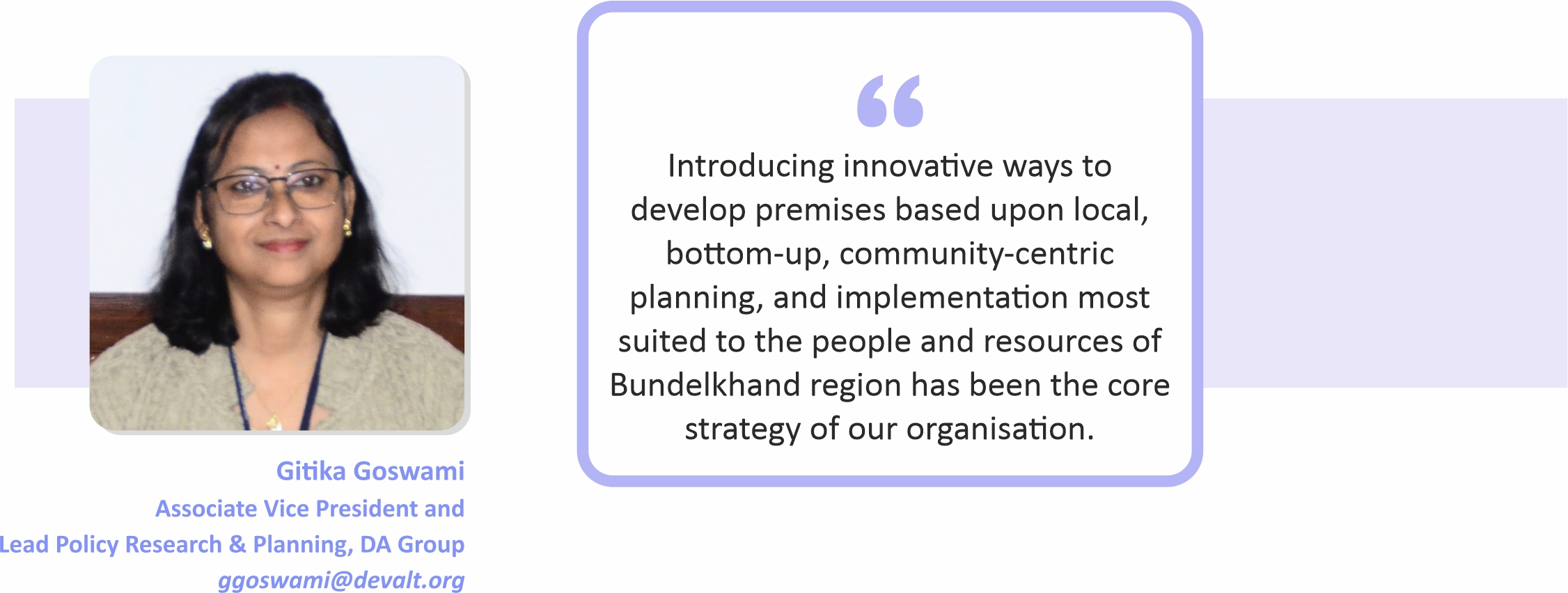Bundelkhand Our Karmabhoomi:
The Journey of Four Decades

The
region of Bundelkhand in central India is flanked by the two states of Uttar
Pradesh and Madhya Pradesh. Agriculture dominates the economic life of the
people here. But the landscape is drought-prone and parched, and receives
low and erratic rainfall. Millions here struggle to make ends meet daily and
often seasonally migrate to the cities for better livelihood opportunities.
With this background, Development Alternatives started working in this area
way back in
the 1990s.
We at Development Alternatives call Bundelkhand our karmabhoomi, and treat it as a social laboratory. We have been engaged with the community, the local institutions and the academics since the 1990s to uplift the community by breaking the shackles of poverty and malnutrition, providing alternative livelihoods and creating a wave of social transformation.
Bundelkhand faces a number of ecological challenges compounded by unsustainable land and water management practices and climate change imapcts, erratic rainfall, delayed monsoon and frequent droughts. Therefore, we started our work by constructing water conservation structures such as check dams, tanks, ponds, gabions and gully plugging, which farmers originally used in Bundela kingdom 600 years ago. These were researched and re-established to overcome climate variabilities and change. We are the pioneers in constructing the check dams in Bundelkhand. The Gurari check dam constructed in 1992 now supplies water to the surrounding areas (approximately 20 villages). To conserve the valuable topsoil and check runoff, contour trenches and farm bunds have been built. Doing so has helped increase soil moisture levels in the region and lower irrigation costs. In an interesting case of a barren hillock in Datia, digging contour trenches arrested water runoff and within two monsoons, long dormant root stocks of indigenous plants, which were almost locally extinct, came out with new shoots.
Further, introducing drought-resistant seeds and organic crops suited to the
local soil along with drip irrigation systems helped alleviate many farming
woes. Encouraging agro-forestry, intercropping, multi-tiered cropping and
agro-horticulture through WADI models additionally enhanced the climate
resilience of the crops and ensured the food security of the region. In
addition, we also formed the Farmer Producer Organisations in the region and
built their capacities on business operations, institutional mechanisms and
collective decision-making, along with exposure to and training in improved
farm practices.
As farm-based livelihoods are now fraught with risks and uncertainties in the face of changing climate, off-farm and farm-linked livelihoods, such as fly ash bricks, e-kiosks, motor winding, poultry, vermicomposting, have been powered. These enterprises created dignified jobs, empowered the women community, made them part of the decision-making system, helped check migration and served the rural communities’ demands that remained largely disconnected from mainstream markets.
 Community institutions such as watershed committees, water users' societies,
women's self-help groups (SHGs), artisans' cooperatives, gram sabhas and
panchayats, with the help from Development Alternatives, use local
intelligence and resources to plan and implement technically, ecologically
and economically viable measures for water and energy supply, and housing
and infrastructure construction. The TARA Karigar Mandal, an artisans'
cooperative that provides affordable housing and infrastructure construction
services using low-carbon and resource-friendly materials and techniques,
was established by Development Alternatives. Self-sustaining locally owned
and community operated models for delivering safe drinking water and
electrification powered by solar energy are other pertinent examples of how
clean technology is being used to help in developing the region and reduce
women’s drudgery a lot.
Community institutions such as watershed committees, water users' societies,
women's self-help groups (SHGs), artisans' cooperatives, gram sabhas and
panchayats, with the help from Development Alternatives, use local
intelligence and resources to plan and implement technically, ecologically
and economically viable measures for water and energy supply, and housing
and infrastructure construction. The TARA Karigar Mandal, an artisans'
cooperative that provides affordable housing and infrastructure construction
services using low-carbon and resource-friendly materials and techniques,
was established by Development Alternatives. Self-sustaining locally owned
and community operated models for delivering safe drinking water and
electrification powered by solar energy are other pertinent examples of how
clean technology is being used to help in developing the region and reduce
women’s drudgery a lot.
Women landowners, entrepreneurs, farmers and artisans have been put at the forefront of local initiatives such as gaushalas, paper-recycling units and literacy programmes. Self-help groups have been monumental in addressing the skewed gender balance in the region.
The Development Alternatives’ community radio—Radio Bundelkhand—run by local reporters is catalysing behaviour change by churning out campaigns for sustainable land and water management, forest rejuvenation, livelihood creation and climate-smart agricultural practices.
The development challenges in Bundelkhand are immense, but so are the opportunities to improve and strive for better. The village economies need to be made resilient, which can happen by making them self-sustaining, addressing the people's aspirations, leveraging technology and forging strong collaborations, as demonstrated by a few examples quoted above. With this spirit, we can proudly say that Bundelkhand is one of the successful climate-resilient models for the entire world!!
